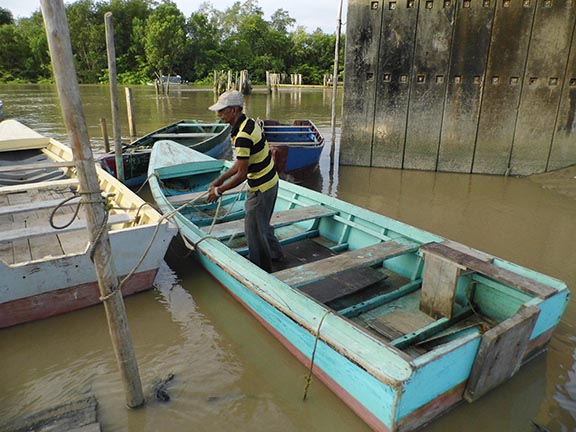For some, fishing is a sport, a hobby or a nice relaxing way to pass the time on a Sunday afternoon. But for the residents of Sheet Anchor Village, East Canje, Berbice, fishing is more than a livelihood and a way to feed their families; it is a way of life. Fishing for the closely-knit community, means a way out of poverty; a means to not go hungry; and a way to paint the village in a bright and positive light in contrast to the criminalized image society has of it. Or at least it was at one point, before the construction of the Berbice River Bridge and the increase of commercial activities in the Berbice River. Now, fishing is nothing but a dying industry in the village.
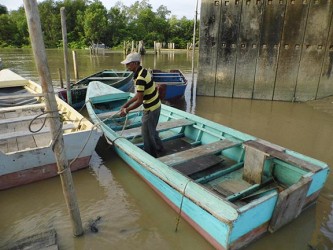 In the 1960s and 1970s, Sheet Anchor Village was a mere speck on the map of the county of Berbice, with a few scattered squatting houses overcrowded with two to three generations of families. Crime, particularly theft and robbery, domestic violence and neighbourhood feuds that turned into family wars were what highlighted the village on the map. This was the way of life, until villagers decided to make use of the Berbice River which borders the village to catch fish. Fishing then became a way to climb out of poverty and develop a level of respectability. Families were able to feed themselves and generations were able to leave their family homes and branch out making lives for themselves on the ‘scales of fishes.’
In the 1960s and 1970s, Sheet Anchor Village was a mere speck on the map of the county of Berbice, with a few scattered squatting houses overcrowded with two to three generations of families. Crime, particularly theft and robbery, domestic violence and neighbourhood feuds that turned into family wars were what highlighted the village on the map. This was the way of life, until villagers decided to make use of the Berbice River which borders the village to catch fish. Fishing then became a way to climb out of poverty and develop a level of respectability. Families were able to feed themselves and generations were able to leave their family homes and branch out making lives for themselves on the ‘scales of fishes.’
Fast forward to present-day Sheet Anchor and it would be accurate to say that the fishing business was once a very prosperous one in the village, but not anymore. Almost 90% of the village is involved in fishing in one way or the other, from the fishermen who go out to catch the fish, and the women who go around selling the catch, to the persons who sell and repair the equipment, including the boats, engines and seines. During a recent visit by Lifestyle, the cry was the same from all involved in the industry, “Business is bad, bad, bad.”
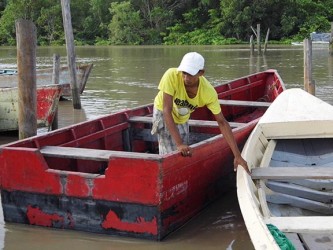
Fifty-five-year-old Christandat Jadundan has been fishing for a livelihood since the age of 16, and is deeply invested in the industry. It has become a family business with his wife, sons and sons-in-law all involved. He says this is the first time in all his life he has experienced such a famine of fish. “It’s like God bank dry up, cause fish hardly running now. Phagwah day (March 6) was the height of spring and we hardly catch any fish,” he lamented.
The fishermen in the village only fish in-shore. Using Chinese seines (and sometimes fishing hooks) they venture out to the mouth of the Berbice River and make fish pens where they corral the fish. “We does juk down wood in the sea and we use
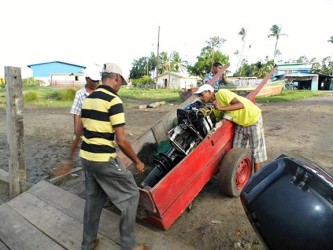
something call chase and we got to juk it like pickets right through to make like a funnel,” Jadundan explains, adding that some 300 to 400 feet in length is usually erected on both sides. The men normally work in pairs and it takes an average of four hours to complete the fish pen. When completed, the men herd the fish into the pen and catch them with the seine.
The tides control the work hours of the fishermen and so they have to be adaptable. “We go out early, sometimes 7.30 in the night and come in back around midnight or 1 am; but we working with the tide, so as the tide changes we have to adjust ourselves,” Jadundan says.
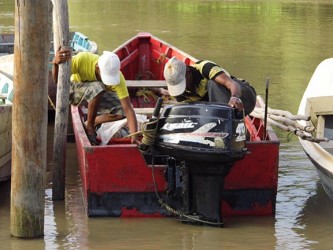
The men fish in both spring and neap tides, though they prefer the spring tides because it affords them better catches. “When fish in season, especially during the spring tide we does catch about five to six baskets of mixed fish: unscale fish, scale fish and shrimps,” he says. Unfortunately, the current weather conditions of unusually high winds and heavy rainfall is making an already frustrating job even more difficult. Now the men count themselves lucky if they even get a half bucket of fish per trip.
These are very hard times and it is having a detrimental effect on the fishermen. “This is our livelihood we depend on and sometimes we go out there and we ain’t get nothing; we does lose we gasoline and all,” Jadundan says. With every trip the men take, they carry with them over $1 million in equipment (boat, engine, seine, baskets, twine, hooks, etc) but have no guarantee the trip will pay off.
“Sometimes when the wind blow high, it does be very rough; the waves does be so rough that we does got to come away back
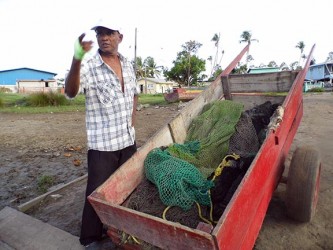
without setting seine,” Jadundan says, indicating that this is happening at present. “All like now it is very rough, sometimes our boat does bore and we does have to hurry and come away. Only recently my son-in-law went out and it was so rough, the waves lift it [the boat] and fling it down back on a chase and puncture it. God save him because he barely made it home alive.”
Nature aside, there have been other negative impacts. The Berbice River Bridge, which is near the mouth of the Berbice River is one of the factors the fishermen attribute to the poor catches they have been getting. According to the fishermen, the location of the bridge has slowed the tide down resulting in a reduction in fish being swept into shore.
Kenny Dhanpat, 54, who has been fishing since he left school at age 14, said, “We use to get free flow of the stream, but since they got a lot of things that occupying the Berbice River, like the bridge, that is what slowing it down. We use to catch a lot of fish, now sometimes when we go we can’t even get half tub. With the storm and now the activities in the river, we ain’t getting fish at all.”
Dhanpat said he fishes for a livelihood and to feed the community but “sometimes we does be lucky to simply come in alive.” He explained, “When you go out there and the breeze torments you, you have to come in back. So there is never a guarantee when you go out there you will return with a catch.”
On average, the men used to catch $10,000 to $12,000 in fish (sold wholesale) and the business was considered a successful one. When fish were bountiful, they would wholesale them so that vendors could make a decent profit. However, when the fish are scarce, as is the case now, the fishermen are forced to retail them themselves to try and cover their overhead expenses.
Dredging in the Berbice River also affects the fishermen. “You see them foreign companies that coming and do business, like Oldendorff, they juk plenty piles in the water and so the tide not running like before and the mud coming and silt up forming banks,” another fisherman said. “Next thing, they got the dredge, that dredging night and day in the sea and when they dig, the mud drop right in the vicinity of where we fish. So the tide doesn’t have the force to move.”
Fisherman Danny Ramdat highlighted yet another challenge. “The region (Region 6 RDC) does cut grass and it does float down and bruk up all we fish pen. They cut it every May-June when the black water comes out and the grass does big and heavy,” he said. He too made mention of the increase in commercial activities in the Berbice River which had negatively impacted their livelihoods, but remarked it is a hopeless situation and nothing could be done about it. “…All the noise and equipment they use does scare the fish away but we can’t do anything about it. They have to do their job and we have to do ours.”
Smiling wryly, Ramdat disclosed that he was born and raised in fishing and has never done any other job.
The ripple effect is that several other businesses are affected. Fish vendors must now go outside the village to procure fish to sell. Because of the trials too, at least 30% of the fishermen in the village have called it quits, and this has resulted in less business for the persons who specialize in selling and repairing fishing equipment. Moreover, fish is now very expensive. For example, persons are now purchasing 2 Bangamary fish for $500, whereas, before, they could have had an entire bucket for $2,500.
Nevertheless, some of the fishermen are still holding on to a sliver of hope that one day the fishing industry will stabilize and return to some resemblance of normalcy. “This season here is very bad but we won’t give up,” declared fisherman Seon Dhanpat. “We use to catch fish every day, now it’s like once a week.” He uses on average 5 gallons of gasoline per trip and since there is no longer any guarantee of success, he has scaled back on the number of trips. “I use to enjoy fishing; when you set your seine and you see the fish running and you don’t even have enough vessels to store it,” Dhanpat reminisced. With his face clouded over by the storms currently tormenting the fishing industry, Dhanpat said “now fish not running so I don’t enjoy it anymore; it is too frustrating.” He said determinedly though, “I’m going to continue to work it how it is … Right now I’m not working to make a profit, I’m just working to survive and feed my family.” The men pay $10,000 every year to renew their fishing licences but they are not a part of any co-op society.

